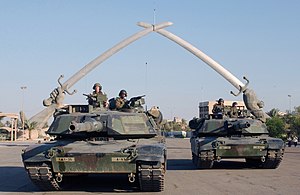ഇറാഖ് അധിനിവേശയുദ്ധം (2003)
ഈ ലേഖനം ഏതെങ്കിലും സ്രോതസ്സുകളിൽ നിന്നുള്ള വേണ്ടത്ര തെളിവുകൾ ഉൾക്കൊള്ളുന്നില്ല. ദയവായി യോഗ്യങ്ങളായ സ്രോതസ്സുകളിൽ നിന്നുമുള്ള അവലംബങ്ങൾ ചേർത്ത് ലേഖനം മെച്ചപ്പെടുത്തുക. അവലംബമില്ലാത്ത വസ്തുതകൾ ചോദ്യം ചെയ്യപ്പെടുകയും നീക്കപ്പെടുകയും ചെയ്തേക്കാം. |
ഇറാഖിൽ സദ്ദാം ഹുസൈൻ്റെ ഏകാധിപത്യവും ഇസ്ലാമിക ഭീകരതയും അവസാനിപ്പിച്ച് ജനാധിപത്യം പുനസ്ഥാപിക്കാൻ ജോർജ്ജ് ബുഷിൻ്റെ നേതൃത്വത്തിൽ അമേരിക്ക നടത്തിയ യുദ്ധമാണിത്. ഇറാഖിന്റെ കൈയിൽ സമൂല നാശകാരികളായ ആയുധങ്ങൾ ഉണ്ടെന്നും ലോകസുരക്ഷ തകരാറിലാണെന്നും ഉള്ള അമേരിക്കൻ വാദത്തിലാണ് രണ്ടാം ഗൾഫ് യുദ്ധത്തിന്റെ ബീജം. 2003 മാർച്ച് 20-നു അമേരിക്കയും ബ്രിട്ടനും പ്രധാന സഖ്യകക്ഷികളായ സേന ഇറാഖിനെ ആക്രമിക്കുകയും 2003 മേയ് 1-നു അധികാരം പിടിച്ചെടുക്കുകയും ചെയ്തു. യുദ്ധത്തിനു ശേഷവും അമേരിക്കക്ക് തങ്ങളുടെ വാദം തെളിയിക്കാനായിട്ടില്ല. അതേസമയം ടൈഗ്രിസിലും യൂഫ്രട്ടീസിലുമൊഴുകുന്ന ജലത്തിലും ഇറാഖിന്റെ കനത്ത എണ്ണ സമ്പത്തിലും അമേരിക്കക്കുള്ള താത്പര്യമാണ് യുദ്ധത്തിന്റെ കാരണം എന്നു ഇറാഖികൾ വിശദമ്ക്കുന്നത്.[അവലംബം ആവശ്യമാണ്] രണ്ടാം ഗൾഫ് യുദ്ധം എന്നും ഇതറിയപ്പെടുന്നു
| ഇറാഖ് അധിനിവേശയുദ്ധം (2003) | |||||||
|---|---|---|---|---|---|---|---|
| the Iraq War ഭാഗം | |||||||
 U.S. Army M1A1 Abrams tanks and their crews pose for a photo in front of the "Hands of Victory" monument at Baghdad's Ceremony Square in November 2003. | |||||||
| |||||||
| യുദ്ധത്തിൽ ഏർപ്പെട്ടിരിക്കുന്നവർ | |||||||
| Coalition forces:
With military support from: | |||||||
| പടനായകരും മറ്റു നേതാക്കളും | |||||||
പ്രമാണം:INC flag.svg Ahmad Chalabi | |||||||
| ശക്തി | |||||||
| 380,000 troops[7]
| 600–800 Ansar al-Islam | ||||||
| നാശനഷ്ടങ്ങൾ | |||||||
| Coalition: 172 killed (139 U.S., 33 UK)[13] 551 wounded (U.S.)[14] Peshmerga: 24+ killed[15] Total: 196+ killed | Estimated Iraqi combatant fatalities: 30,000 (figure attributed to General Tommy Franks) 7,600–11,000 (4,895–6,370 observed and reported) (Project on Defense Alternatives study)[16][17] 13,500–45,000 (extrapolated from fatality rates in units serving around Baghdad)[18] | ||||||
| Estimated Iraqi civilian fatalities: 7,269 (Iraq Body Count)[19] | |||||||
അവലംബം
തിരുത്തുക- ↑ Graham, Bradley (7 April 2003). "U.S. Airlifts Iraqi Exile Force For Duties Near Nasiriyah". Washington Post. Retrieved 13 September 2009.
- ↑ John Pike (14 March 2003). "Free Iraqi Forces Committed to Democracy, Rule of Law – DefenseLink". Globalsecurity.org. Archived from the original on 10 September 2009. Retrieved 13 September 2009.
- ↑ ഉദ്ധരിച്ചതിൽ പിഴവ്: അസാധുവായ
<ref>ടാഗ്;USNewsandworldreportഎന്ന പേരിലെ അവലംബങ്ങൾക്ക് എഴുത്തൊന്നും നൽകിയിട്ടില്ല. - ↑ Kim Ghattas (14 April 2003). "Syrians join Iraq 'jihad'". BBC News. Retrieved 29 October 2011.
- ↑ "Arab volunteers to Iraq: 'token' act or the makings of another Afghan jihad?". Archived from the original on 2011-11-27. Retrieved 29 October 2011.
- ↑ "Security Council endorses formation of sovereign interim government in Iraq; welcomes end of occupation by 30 June, democratic elections by January 2005". United Nations. 8 June 2004.
- ↑ Katzman, Kenneth (5 February 2009). "Iraq: Post-Saddam Governance and Security" (PDF). http://fpc.state.gov/. Congressional Research Service. Retrieved 23 September 2014.
In the war, Iraq's conventional military forces were overwhelmed by the approximately 380,000- person U.S. and British-led 30-country18 "coalition of the willing" force, a substantial proportion of which were in supporting roles.
{{cite web}}: External link in|website=|quote=at position 95 (help) - ↑ "A Timeline of Iraq War, Troop Levels". Huffington Post. Associated Press. 15 April 2008. Retrieved 23 February 2014.
- ↑ ഉദ്ധരിച്ചതിൽ പിഴവ്: അസാധുവായ
<ref>ടാഗ്;PolishSpecialForcesഎന്ന പേരിലെ അവലംബങ്ങൾക്ക് എഴുത്തൊന്നും നൽകിയിട്ടില്ല. - ↑ ഉദ്ധരിച്ചതിൽ പിഴവ്: അസാധുവായ
<ref>ടാഗ്;MajPeltierഎന്ന പേരിലെ അവലംബങ്ങൾക്ക് എഴുത്തൊന്നും നൽകിയിട്ടില്ല. - ↑ "ആർക്കൈവ് പകർപ്പ്" (PDF). Archived from the original (PDF) on 2011-08-07. Retrieved 2015-07-13.
- ↑ Toby Dodge (16 November 2002). "Iraqi army is tougher than US believes | World news". The Guardian. Retrieved 2012-11-10.
- ↑ "Iraq Coalition Casualties: Fatalities by Year and Month" Archived 2016-02-06 at the Wayback Machine. iCasualties.org. Retrieved on 1 November 2009.
- ↑ icasualties Iraq Coalition Casualties: U.S. Wounded Totals Archived 2011-12-24 at the Wayback Machine.
- ↑ Willing to face Death: A History of Kurdish Military Forces – the Peshmerga – from the Ottoman Empire to Present-Day Iraq (page 67) Archived 2013-10-29 at the Wayback Machine., Michael G. Lortz
- ↑ 16.0 16.1 "The Wages of War: Iraqi Combatant and Noncombatant Fatalities in the 2003 Conflict | Commonwealth Institute of Cambridge". Comw.org. Archived from the original on 2 September 2009. Retrieved 13 September 2009.
- ↑ "Wages of War – Appendix 1. Survey of reported Iraqi combatant fatalities in the 2003 war | Commonwealth Institute of Cambridge". Comw.org. Archived from the original on 2 September 2009. Retrieved 13 September 2009.
- ↑ "Body counts". By Jonathan Steele. The Guardian. 28 May 2003.
- ↑ Iraq Body Count project. Source of IBC quote on undercounting by media is Press Release 15 :: Iraq Body Count. Archived 2009-11-09 at the Wayback Machine.